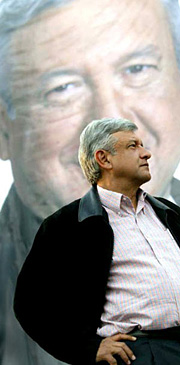
|  |  |  Editorials | Issues | December 2008 Editorials | Issues | December 2008  
What's Next for Andrés Manuel López Obrador?
 David Agren - World Politics Review David Agren - World Politics Review
go to original


| | Andrés Manuel López Obrador |  |
Mexico City - Andrés Manuel López Obrador marked the second anniversary of his "legitimate government" - a symbolic opposition shadow government - with a rally in Mexico City, Nov. 23. But the mood was hardly festive, as the scorned 2006 presidential runner-up suffered a series of crushing setbacks in the preceding weeks.

The energy reform package he branded as "privatization" and crusaded tirelessly against throughout 2008 was approved by Congress in late October, with backing from lawmakers in his own Democratic Revolution Party (PRD). The federal electoral tribunal dealt him a blow Nov. 12 when it overturned the annulled PRD internal election and awarded the party leadership to an anti-López Obrador faction. Adding insult to injury, PRD lawmakers loyal to the new party leadership began withholding monthly support payments of up to $1,500 that finance his "legitimate government."

Undeterred, López Obrador unveiled a new theme for winning support during the upcoming third year of his running campaign of opposition: Rescuing the slumping "family economy," and railing against the small band of business elites and the "political mafia" that he says control the country and which he blames for rigging the 2006 election.

The message went largely unheard, however. Fewer than 40,000 adherents marched through central Mexico City that day, a far cry from the estimated 300,000 that witnessed his coronation as the nation's self-proclaimed "legitimate president" two years ago. And few from the PRD attended. Some marchers carried acerbic signs lampooning the new PRD leadership. Many others sported colors of the smaller Convergence and Labor parties, two left-wing parties that ran in a 2006 coalition with the PRD and have been unwavering in their support for López Obrador. Press coverage was scant.

López Obrador is seeking to remain relevant in 2009 by capitalizing on new crises, like the deteriorating economic situation that has sent the peso tumbling and prices soaring. But his constant protests and admonishments to eschew working with President Felipe Calderón are splitting the Mexican left and driving away potential supporters.

The PRD's leadership election earlier this year - a scandalous affair rife with allegations of vote tampering, ballot box thefts and improper campaigning - was fought between the party's moderate faction that advocates making deals with political rivals, including Calderón, and hardliners adhering to López Obrador's populist and anti-establishment positions.

López Obrador's preferred candidate eventually lost the contest, costing the former Mexico City mayor enormous influence over candidate nominations and the disbursement of the approximately $40 million the PRD receives annually in public financing.

With the party leadership now comprised of López Obrador's political enemies and with more than 10,000 López Obrador loyalists having already bolted for the Convergence party, the PRD risks splitting. But even with the recent setbacks and plunging poll numbers, many analysts and politicians still describe López Obrador as key for marshaling support for the Mexican left. He remains one of the few consistent opponents of the federal government, especially now that Calderón regularly wins Institution Revolutionary Party (PRI) support to pass his agenda of reforms.

"He's the most important voice of protest in this country," said Convergence party Deputy José Manuel del Río Virgén. "He still has strength."

Still, that strength may be fading. A September poll by Ulises Beltrán y Asociados that was published in the Mexico City newspaper Excélsior found that López Obrador still enjoys high name recognition - second only to Calderón among public figures and far beyond any others in the PRD.

But the poll also found that 50 percent of respondents expressed a negative opinion of the former presidential candidate. His PRD is now polling under 20 percent, down from the 35 percent he captured in the presidential election. Much of the lost support has drifted over to the resurgent PRI.

"The level of rejection toward the PRD is of such a magnitude that those looking to cast a protest vote no longer see the PRD as an attractive option. They're going to the PRI," said pollster Jorge Buendía, of the Mexico City firm Buendía & Laredo.

But elections may no longer matter to López Obrador, whose alternative government is separate from the PRD and described by one follower at his most recent rally as "continually moving further away." Some in the PRD also accuse López Obrador of failing to take the party's well-being into consideration and abandoning the democratic process.

"[He] is no longer thinking about elections," PRD director of policy formation Fernando Belaunzarán said during the summer. "The main thing he's thinking of is collapsing the system."

His shift to focusing on a sinking economy may be part of that thinking, according to Federico Estévez, political science professor at ITAM in Mexico City.

"He was betting that the Mexican economy would sink, and now it turns out that it may sink because of the world," Estévez said. "It's no longer an untenable strategic position."

David Agren covers politics and national affairs for The News, Mexico City's English-language daily. He has been reporting on the country since January 2005 for both foreign and domestic publications, including Catholic News Service, the Ottawa Citizen, The Globe and Mail and the now-defunct Miami Herald Mexico edition. |

 |
|  |



